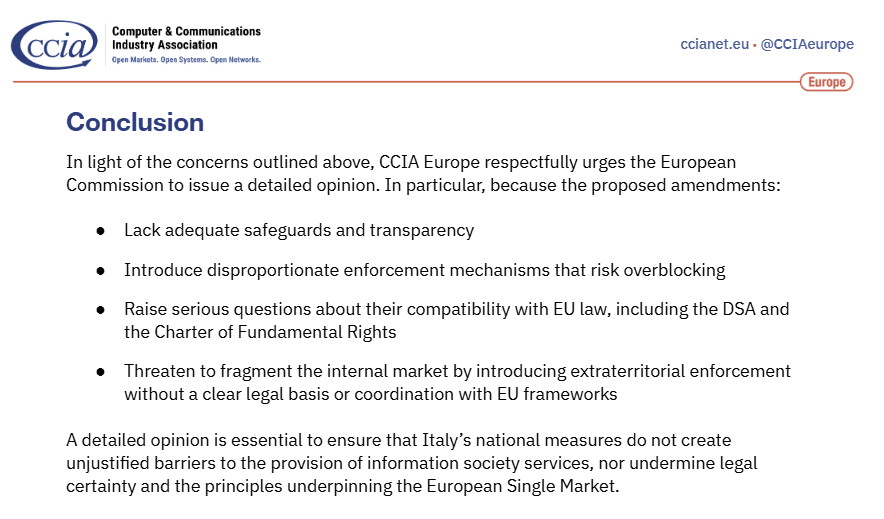
CCIA Urges Italian Govt to Withdraw Pending ‘Piracy Shield’ Legislation and Engage TRIS
- EU regulators were formally urged to review Piracy Shield under the Technical Regulation Information System procedure.
- CCIA commented on automated enforcement with little oversight and legal ambiguity in cross-border actions.
- Other flagged aspects were transparency governance issues, systemic overblocking, and network-level blocking ineffectiveness.
Italy’s ambitious anti-piracy initiative, Piracy Shield, is under renewed scrutiny as leading technology companies urge the European Commission (EC) to assess its legality within the framework of EU law.
Developed to combat live sports piracy by enabling rapid blocking of infringing websites, Piracy Shield has faced significant criticism for its lack of transparency, procedural safeguards, and a history of overblocking legitimate online content.
The Computer & Communications Industry Association (CCIA), representing major players such as Amazon, Apple, Google, Cloudflare, and Meta, formally called on EU regulators to review Piracy Shield under the Technical Regulation Information System (TRIS) procedure.
The CCIA highlights that the platform allows rightsholders to demand site-blocking orders executed within just 30 minutes, often without sufficient oversight, transparency, or timely recourse for affected parties.
CCIA’s PDF submission to the Italian regulator AGCOM stresses several core concerns, including the fact that blocking requests are processed rapidly, with no robust verification by AGCOM and no independent review or appeal mechanism available to those wrongly affected.
The technical specifications and operational rules of Piracy Shield remain undisclosed, and its development lacked meaningful stakeholder input.
Notable incidents, such as the inadvertent blocking of Google Drive and large-scale disruption to shared IP addresses at Cloudflare, exemplify the potential collateral damage.
Proposals enabling AGCOM to order content removal hosted in other EU member states appear misaligned with the Digital Services Act, undermining the EU’s country-of-origin principle and creating regulatory uncertainty.
The CCIA argues that the approach is easily circumvented and does not address the root causes of piracy, making it an inadequate long-term strategy.
Given the serious implications for the internal EU market, cross-border digital services, and fundamental rights, the CCIA urges the EC to issue a detailed opinion on Piracy Shield’s compatibility with EU law. However, no timeline has been provided for an official decision.










